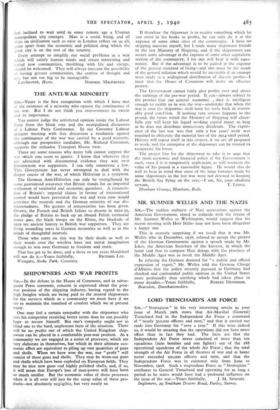SHIPOWNERS AND WAR PROFITS
SIR,—In the debate in the House of Commons, and in subse- quent Press comment, concern is expressed about the post- war position of the shipping industry, having regard to the high freights which are being paid to the neutral shipowners for the services which as a community we must have if we are to maintain the standard of comfort which we at present enjoy.
One may feel a certain sympathy with the shipowner who sees his competitor receiving better terms than he can possibly hope to secure himself. But one's sympathy ought not to blind one to the hard, unpleasant facts of the situation. There will be no profits out of which the United Kingdom ship- owner can be placed in a comfortable post-war position. As a community we are engaged in a series of processes, which are very elaborate in themselves, but which in their ultimate eco- nomic effect are equivalent to piling up vast quantities of guns and shells. When we have won the war, our " profit " will consist of these guns and shells. They may be worn-out guns and shells which have been exploded on European fields. They may be nice new guns 2nd highly polished shells, and, if so, it will mean that EurOpe's loss of man-power will have been so much smaller. But the economic value Of these processes when it is all over will just be the scrap value of these pro- ducts—not absolutely negligible, but very nearly so.
If therefore the shipowner is to receive something which he can enter in his books as profits, he can only do it at the
expense of some other class of the community. I have no shipping interests myself, but I made many shipowner friends in the last Ministry of Shipping, and if the shipowners can secure some advantage at the expense of some other capitalistic section of the community, I for one will bear it with equa- nimity. But if the advantage is to be gained at the expense of the general standard of living—and this must be the result of the general inflation which would be inevitable if an attempt were made a a widespread distribution of illtrave profits—I trust that the House of Commons will make an effective protest.
The Government cannot fairly give profits over and above the earnings of the pre-war period. It can—always subject to the proviso that our general economic ,alicy is intelligent enough to enable us to win the war—undertake that when the _war is over the shipowner shall have his tools back in reason- ably good condition. If nothing very serious happens to the pound, the terms which the Ministry of Shipping will cheer- fully pay will keep his liquid working capital intact so long as he does not distribute unnecessary dividends. The experi- ence of the last war was that only a few years' work was required to obliterate the material loss of the 1914-1918 period. History will repeat itself in this respect, if we are all prepared to work, and the enterprise of the shipowner can be trusted to recuperate his losses.
The proper line for the shipowner to take is to urge that the main economic and financial policy of the Government is such, even if it is temporarily unpleasant, as will maintain the value of his pound at a reasonable figure. He would also do well to bear in mind that some of the large fortunes made by some shipowners in the last war were not devoted to keeping the British flag flying on the seas.—I am, Sir, your obedient














































 Previous page
Previous page